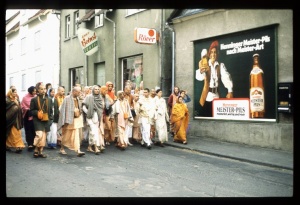SB 1.13.8 (1965)

A.C. Bhaktivedanta Swami Prabhupada
TEXT No. 8
Yudhisthira uvacha Api smaratha no yusmat pakshach chhaya samedhitan Vipad ganad visadagnader mochita yat sa matrikah.
ENGLISH SYNONYMS
Yudhisthira uvacha—Mahārāja Yudhiṣṭhira said, Api—whether, Smaratha—you do remember, No—us, Pakshach—partiality upon us like the wings of the bird, Chhaya—protection, Samedhitan—us who were brought up by you, Vipadganad—from various types of calamities, Visad—by administration of poison, Agnader—by setting on fire, Mochita—released from, Yat—what you have done, Sa—along with, Matrika—our mother.
TRANSLATION
Maharaj Yudhisthir said, "my uncle do you remember us who were always protected by you along with our mother from all sorts of calamities by your partiality wings of a bird even in the matter of administration of poison to us or setting on fire to our home?"
PURPORT
Due to Pandu's death at an early age his minor children and widow were the object of special care for all the elderly members of the family specially by Bhismadeva and Mahatma Vidura. Vidura was more or less partial for the Pandavas on account of their political position. Although Dhritarastra was equally careful for the minor children of Maharaj Pandu yet he was one of the intriguing party who wanted to wash off the descendants of Pandu and replace them by ascending the sons of Dhritarastra to become the rulers of the kingdom. Mahatma Vidura could follow this intrigue of Dhritarastra and company and therefore even though he was a faithful servitor of his eldest brother Dhritarastra, he did not like his political ambition for the sake of his own sons. He was therefore overcareful for protection of the Pandavas and their widow mother and as such he was so to say more partial to the Pandavas than to the sons of Dhritarastra although both of them were equally affectionate in his ordinary eyes. He was equally affectionate to both the camps of nephews in the sense that he always chastised Duryodhone for his intriguing policy against his cousins. He always criticised his elder brother for his policy of encouragement to his sons and at the same time he was always alert in the matter of giving special protection to the Pandavas. All these different activities of Vidura within the palace politics, made him well known as partial to the Pandavs and Maharaja Yudhistira has referred to the past history of Vidura before his going away from home for prolonged pilgim's journey. Maharaj Yudhisthira reminded him whether he was equally kind and partial to his grown up nephews even after the battle of Kurukshetra a great disaster of family quarrel.
Before the battle of Kurukshetra Dhritarastra's policy was peaceful annihilation of his nephews and therefore he ordered Purochana to build up a house of lac at Varanabat and when the building was finished Dhritarastra desired that his brother's family may live there for some time. When the Pandavas were going there in the presence of all the members of the royal family, Vidura tactfully gave instructions to the Pandavas about the future plan of Dhritarastra. This is specifically described in the Mahabharata (Ch. 144 Adiparva.) He gave hint indirectly "that even a weapon not made of steel or any other material element can be more sharpen to kill the enemy and who knows this is never killed". That is to say he gave hint that the party of the Pandavas was being sent to Varanabat for the sake of being killed and thus he gave hint to Yudhisthira to become very careful in their new residential palace. He also gave indication of fire and said that fire cannot extinguish the soul but it can do so for the material body but one who protects the soul can live only. Kunti could not follow such indirect conversations between Maharaj Yudhisthira and Vidura and thus when she enquired from her son about the purport of the conversation, Yudhisthira replied that from the talks of Vidura it is understood that there is hint of fire in the house where they were proceeding. Later on Vidura came in disguise to the Pandavas and informed them that the house keeper was going to set fire in the house on the fourteenth night of waning moon. It was an intrigue of Dhritarastra that the Pandavas might die all together with their mother. And by his warning the Pandavas escaped through a tunnel underneath the earth so that their escape was also unknown to Dhritarastra so much so that after setting in the fire the Kouravas became as sure as anything about the death of the Pandavas and Dhritarastra performed the last rites of death with great cheerfulness. And during the mourning period all the members of the palace became overwhelmed with lamentation but Vidura did not become so on account of his knowledge that the Pandavas were alive somewhere underneath the sky. There are many such incidences of calamities and in each of them Vidura gave protection to the Pandavas on one hand and on the other he tried to restrain his brother Dhritarastra from such intriguing policy. Therefore, he was always partial to the Pandavas as much as the bird protects its eggs by the wing.